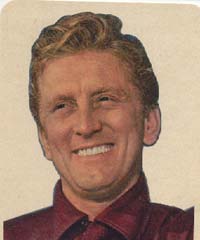
The life of actor-producer Kirk Douglas reads like a Horatio Alger success story. A first-generation American, Douglas was born Issur Danielovitch Demsky on 9 December 1916, in Amsterdam, New York. His parents, Russian born Jews who immigrated to the United States in 1910, were Harry and Bryna Demsky. The family, which consisted of six daughters and one son, found it financially difficult to survive during the Depression years. Young Issur (or Isadore Demsky, as he was later called) worked his way through school selling newspapers and a variety of other items.
Kirk Douglas first became interested in drama when he attended Wilbur Lynch High School in Amsterdam. Encouraged by his teacher, Louise Livingston, he participated in various kinds of dramatic and oratorical activities. In 1935 he graduated from high school, eager to attend college, for which he first had to earn the tuition money. From 1935 to 1939 he attended St. Lawrence University, Canton, New York, where he won recognition as president of the student body, the Mummers dramatic society, and the National Student Federation of America; he was, in addition, an intercollegiate wrestling champion. Later he would recall those years in a story for publication, “A Call to ‘Gamblers’.”
Like other aspiring actors, Douglas chose to pursue his profession in New York City. In 1941 he won a scholarship to the American Academy of Dramatic Arts and supported himself by living in the Greenwich Village Settlement House, waiting on tables at Schrafft’s, teaching dramatics to children, and doing odd jobs. It was during his year at the American Academy that he chose his stage name. Douglas made his Broadway debut in 1941 as a singing telegraph boy in Spring Again. The advent of World War II provided him with a new career in the U.S. Navy. Douglas attended Midshipman School at Notre Dame University and was subsequently commissioned as an ensign. He served with an anti-submarine patrol in the Pacific until he received a medical discharge following injuries in 1944. He was discharged with the rank of lieutenant (j.g.).
Kirk Douglas got his first “break” soon after his return to civilian life when he was chosen to replace Richard Widmark as the juvenile lead in Kiss and Tell. He also worked as an actor in radio soap-operas and in four other plays: Trio (1944), Star in the Window, Alice in Arms (1945), and The Wind Is Ninety (1945). The latter play won Douglas both critical acclaim and the attention of Hollywood. Lauren Bacall, one of Douglas’s fellow students at the Academy, recommended Douglas to producer Hal Wallis, and his screen test was so successful that he won the lead opposite Barbara Stanwyck in The Strange Love of Martha Ivers (1946). Earning roles in Out of the Past (1947), Mourning Becomes Electra (1947), The Walls of Jericho (1948), My Dear Secretary (1948), and A Letter to Three Wives (1948), Douglas quickly established himself in motion pictures. In 1948 Douglas was nominated for an Academy Award for his performance in Champion, a film about an ambitious and ruthless prize fighter. With this picture, Douglas’s image as a “tough rogue” was established, though he also evinced a softer side.
Douglas was nominated for an Oscar again in 1952 for The Bad and the Beautiful and in 1956 for Lust for Life, for which he also won the New York Critics Award. Other outstanding films during these years included The Glass Menagerie (1950), Detective Story (1951), The Big Sky (1952), 20,000 Leagues Under the Sea (1954), and Man Without a Star (1955).
Having made his mark as one of the most successful actors in Hollywood, Douglas was not content to let his career rest. He turned his attention toward the production of films, and in 1955 he formed an independent film company, Bryna Productions. Douglas has appeared in a number of Bryna’s motion pictures: The Indian Fighter (1955), Paths of Glory (1957), The Vikings (1958), Spartacus (1960), The List of Adrian Messenger (1963), Seven Days in May (1964), A Gun Fight (1971), The Light at the Edge of the World (1971), Scalawag (1973), and Posse (1975). Leading roles in numerous other films also kept the filmmaker busy; among them were Ulysses (1955), Top Secret Affair (1957), Gunfight at the O.K. Corral (1957), The Last Train from Gun Hill (1959), The Last Sunset (1961), Town Without Pity (1961), Lonely Are the Brave (1962), Two Weeks in Another Town (1962), For Love or Money (1963), In Harm’s Way (1965), The Heroes of Telemark (1965), Cast a Giant Shadow (1966), The Way West (1967), A Lovely Way to Die (1968), and The Arrangement (1969). The Bryna television series, Tales of the Vikings (1959), was an outgrowth of its film, The Vikings.
Because of both his work and his personal interests, Kirk Douglas has traveled widely. On behalf of the State Department and the U.S.I.A. he toured South America in 1963, the Far East in 1964, Europe and the Middle East in 1965, and Eastern Europe in 1966. For his efforts he was lauded by Presidents Kennedy and Johnson and by the United States Congress. In 1967 he served as Public Affairs Director of the U.S. Olympic Committee.
These varied facets of Douglas’s life have earned recognition both in his own industry and beyond. In 1958 his alma mater, St. Lawrence University, awarded him a Doctor of Fine Arts degree. In 1968 the Hollywood Foreign Press Association presented him the DeMille Award for his contributions to the international motion picture industry, and the Thomas A. Dooley Foundation has also given him its Splendid American Award. Among the top international awards he received was his appointment in 1990 as Officier de la Legion d’Honneur for distinguished services to France in arts and letters. He was awarded a Presidential Medal of Honor in 1981 by President Jimmy Carter.
In 1991, the American Film Institute singled him out for its Life Achievement Award. In 1995, the John F. Kennedy Center for Performing Arts distinguished him with its award for contributions to U.S. cultural life. In 1996, the Academy of Motion Pictures honored him with a Special Oscar for 50 years as a creative and moral force in the motion picture community.
Kirk Douglas’s conscience has often found an outlet in his movies. The TV movie Amos, which earned him Emmy and Golden Globe nominations, focused public attention on abuse of the elderly. His efforts have also included editorials and letters to newspapers, appearances on national television, and testimony before the Congressional Select Sub-Committee on Aging. In 1992, through the TV movie, The Secret, he attacked the social stigma associated with dyslexia. His performance was singled out as the year’s best by the Los Angeles Times critics and earned him the Einstein Award from the National Dyslexia Research Foundation.
In the 1980s, Kirk Douglas and his wife Anne formed the Douglas Foundation in order to make more significant and meaningful contributions to civic and charitable causes. The Douglas Foundation has supported both large organizations (such as Cedars-Sinai Medical Center) and small ones (such as the Access Theater for the Handicapped). In recent years, the Douglas Foundation has targeted the Los Angeles Mission for the Homeless, which has opened the Anne Douglas Center for Women, and the Motion Picture Relief Home’s Alzheimer’s Unit, which has been named “Harry’s Haven” after Mr. Douglas’s father. The Douglas Foundation is currently restoring neglected playgrounds of Los Angeles schools and also building a series of playgrounds in Israel.
In 1991, Douglas was involved in a serious helicopter crash in which two people were killed and Douglas suffered a serious back injury. In 1996, he had a stroke which affected his speech. For a time, he believed this would end his career as an actor, but with the encouragement of his friends and family, he kept working with a speech therapist and at the end of 1998 he returned to the screen in Diamonds, followed by an Emmy-nominated guest star role for Touched by an Angel.
When not acting, Douglas occupies his time writing. His autobiography, The Ragman’s Son, published in 1988, received rave reviews and became an international bestseller. He followed it up with three novels (Dance with the Devil in 1990, The Gift in 1992, and Last Tango in Brooklyn in 1994) and children’s books (The Broken Mirror in 1997). In 1997, he published a sequel to his autobiography entitled Climbing the Mountain: My Search for Meaning. His second children’s book, Young Heroes of the Bible, was published in October of 1999. The third installment of his autobiography, My Stroke of Luck, came out in January 2002.
Kirk Douglas is married to the former Anne Buydens; they have two sons. Peter Douglas is a producer in Los Angeles who also assists his parents in their foundation work. Their younger son, Eric, died in 2004. Kirk Douglas has two sons by his first marriage to Diana Dill– Michael Douglas, now an actor-producer, and Joel, also a producer.
Digital Documents
Kirk Douglas Fan Club publication 1950
Photos and press release of Douglas family, 1956
Letter from Kirk Douglas to Tino Balio on donating his papers to the WCFTR, 1969
Related Links
